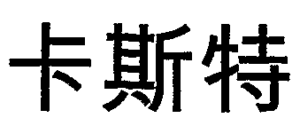On 17 January 2018, the French Supreme Court (Cour de cassation) held that affixing a prior trademark, without consent, to products exclusively intended for export to and lawful sale in China constitutes trademark infringement.
The dispute involved the French wine company Castel Frères, owner of a number of French and European trademarks for alcoholic beverages and still wines. Among them is the following Chinese sign, which reads “KA SI TE” and best corresponds to “Castel” in Chinese:
In 2010, Castel Frères claimed trademark infringement against two individuals who had affixed the above sign to wine bottles in France for export to China. The defendants argued that their use was with due cause, since they were only exporting their products to China, where they had been the owners of the prior Chinese trademark “KA SI TE” for wine, equivalent to “Castel”. In their view, they were legitimately exercising their right of first sale in a market in which they owned valid trademark rights.
The Paris Court of Appeal found that the defendants had no due cause to affix such trademark in France.
On further appeal, the French Supreme Court upheld the decision based upon Articles L.713-2 and L.716-10 of the French Intellectual Property Code, under which a trademark owner may prevent all third parties from reproducing the trademark for goods or services that are identical to those designated in the registration, as well as exporting goods presented under an infringing trademark.
The French Supreme Court noted that, under its prior case law, it had interpreted these two provisions as creating a due cause exception where (i) the defendant merely exports the goods to a country in which they are sold legally, and (ii) if there is no risk that they could be marketed in France (French Supreme Court 10 July 2007, Buttress BV vs. L’Oréal, “Nutri Rich”; further confirmed by Paris Court of Appeal, 29 September 2015, “Aroma Floris”).
The Court overruled this precedent by relying on CJEU case law which had decided that Article 5(1) of the Trademark Directive 2008/95 (Article 10(2)(a) of the recast Trademark Directive 2015/2436) embodies a complete harmonization of the rules relating to the rights conferred by a trademark. As the Directive does not provide for such a due cause exception, the Court found that the previous case was an incorrect application of the harmonization principle.
It is now clear that due cause for exportation purposes can no longer defeat a claim for trademark infringement. As a consequence, the Court concluded that the defendants infringed Castel Frères’ trademark.
It might also have been noted that under the wording of the French Intellectual Property Code, only the holder of goods presented under an infringing trademark can rely on a “legitimate reason” to escape liability, but not the exporter. Indeed, Article L.716-10 of the French Intellectual Property Code provides that “A person who: a) holds, without legitimate reason, imports under all customs procedures or exports goods presented under an infringing trademark (…) shall be liable to a three-year imprisonment and a fine of € 300.000”.
The decision of the French Supreme Court means that French courts can no longer create exceptions to the trademark owners’ rights that are not provided in the Trademark Directive. In practice, this decision will be of interest to trademark owners as it removes an obstacle to an infringement ruling in their favor.
_____________________________
To make sure you do not miss out on regular updates from the Kluwer Trademark Blog, please subscribe here.



